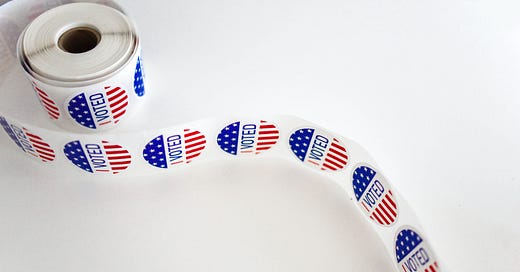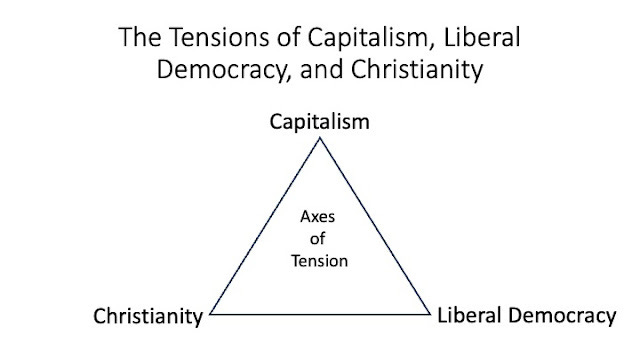The Tensions Between Christianity, Capitalism, and Liberal Democracy
Part 1, The Encroachment of Monied Power Upon the Will of the People
Recently, in pondering political theology, a triangle appeared in my mind. I imagined a triangle with labels at the three vertices: Christianity, liberal democracy, and capitalism.
With that triangle in mind, I began contemplating the tensions that exist between each of these points. Each side of the triangle is hotly disputed, controversial, and contentious. These three things--Christianity, liberal democracy, and capitalism--don't play very well together. Christianity, liberal democracy, and capitalism don't exist side by side in perfect harmony. Here's the triangle:
I imagined this triangle to sort out and disentangle the tensions that exist between Christianity, capitalism and liberal democracy, for there are points of tension unique to each pair. And yet, these tensions are often conflated in a confusing jumble that thwarts clear analysis.
In this series, I mainly want to think about the particular tensions related to Christianity. Specifically, I want to describe how the political desires of evangelicals for a "Christian nation" betray deep incoherences, theological incoherences, yes, but also economic and political incoherences. In the next two posts, I'll focus on those sides of the triangle.
To be clear, my observations in this series will not be particularly unique. Any novelty here is the triangle itself, which I think has some pedagogical value in visually illustrating, in a simple figure, perennial issues in political theology.
Before turning to the sides related to Christianity, today let's focus on the tensions between capitalism and liberal democracy. While this tension isn't explicitly theological, much of American political and economic life is experienced here in the push and pull between the common good and free markets:
Again, I'm claiming no novelty here by drawing attention to how liberal democracy and capitalism are uneasy bedfellows. It is common knowledge that this relationship is fraught and contentious. More importantly, the balance of power between these two can swing back and forth. Or become persistently tilted toward one side.
For example, whenever we see the government break up big monopolies, railroad and oil tycoons way back when or Big Tech today, we see the tensions between liberal democracy and capitalism. Examples abound. Policies passed to raise the minimum wage. All the regulatory agencies, from the EPA to the FDA, focusing on labor, consumer, and environmental protection. Progressive taxation. Medicare and Medicaid. Social Security. Calls for universal healthcare. Public education. Affordable housing policies. The Federal Reserve affecting interest rates. All our arguments about the influence of corporate money on electoral politics. Global trade polices. Immigration polices. The military-industrial complex. Financial regulations to protect investors. On and on and on.
The point should be clear. Many of us tend to think that liberal democracy and capitalism go together like hand and glove. But they don't. The relationship is tense and agonistic. For the most part, the relationship involves democratic politics beating back the rapacious encroachments of the profit motive upon the common good. Simply but, where liberal democracy is committed to fairness and equity, capitalism is a reliable engine of inequity where the "rich get richer and the poor get poorer." Many think, and I believe reasonably so, given the influence of monied interests upon Washington DC, that America is functionally an economic oligarchy, what Robert Reich has described as "supercapitalism." We are ruled by the rich.
To be clear, I'm not denying the power of capitalism in creating economic opportunity, mobility and prosperity. It's worth contemplating the historical impacts of capitalism upon world prosperity in helping humanity escape the Malthusian trap. And yet, to return to my point, to admit the power of free markets in providing widespread prosperity is not to deny that capitalism is an engine of economic inequality that can destabilize and undermine the democratic project. If the distance between the 1% and the 99% gets too large and is not redressed, widespread labor and economic unrest will blow up the American experiment. This is a live possibility, which is why democratic politics is constantly attending to and mending the constant rips capitalism makes in the fabric of the common good.
To sum up, my main interest with my triangle concerns the tensions between Christianity and capitalism and between Christianity and liberal democracy. I'll turn to those tensions in the next two posts. Political theology is my focus. However, the tensions that exist between capitalism and the democratic pursuit of the common good are worthy of theological reflection in themselves. Much of American life plays out on this side of the triangle, how democratic policies must constantly address and redress the encroachment of monied power upon the will of the people.






The whole idea of neo-liberalism is that the two, liberal democracy and capitalism serve eachother, but both by betraying core values. if you want to analyze this relationship you really need to distinguish between the principles of capitalism, and the current practice of capitalism. Also the principles of liberal democracy and the current practice of liberal democracy.
They don´t in principle work together because capitalism tends towards monopoly and oligarchy. Democracy thrives on a just distribution of property at the very least, when the citzens are stakeholders in their businesses and own their land. So this is a conflict in principle. And there are many others. But the last great anti-trust act was in the 1920s. Glass-Stegal was repealed. which is to say...
In practice, capitalism has come to dominate the relationship, and capitalism has its own death drive. Liberal democracy and capitalism itself have in this stage of development almost totally abandoned principle and work to gether. The US military tends to attack countries that threaten the dollar. Curious, countries like Iraq, Libya who threatened to de-peg oil from the dollar. Also capitalism in the form of big tech has come to serve not only the surveilence state but has become very active in the control of information and active in elections. This is obviously just the tip of the iceberg but your analysis seemed wanting in this regard. Also capitalism at this late-stage is no longer about free competition. In the most crucial sectors its impossible for people to break in. Also money itself since the fall of bretton woods plays an increasingly mysterious and nefarious role that cannot be comprehended either within the austrian, chicago, or keynsian interpretation of the role of money in an economy. The current practice breaks every rule. Good day, sir!
Dr. Beck, as I read this informative and very useful post the thought formed in my mind, "Who is John Galt?" And the answer just as surely came, "Well, he ain't Jesus Christ and THAT's for damned sure!"
When I was a pot-smoking, deeply insecure teenager, I was taken with Ayn Rand and her "Atlas Shrugged" and all that ultra-Capitalist jazz . . . but then I grew up. For a while in my later teens right up to my twentieth year, I was an altruistic hedonist, which is a pretty good practical description of liberal democracy, wouldn't you say? But then I ran smack dab hard into the Rock of Jesus Christ who broke me to pieces and then put me back together to make me into what I am now and have been for about the last five decades, an imperfect follower of the One and Only Savior King.
Neither Capitalism nor Liberal Democracy can save us, nor ever will, and the whole entire world is about to find that out in a hurry any day now . . . but Jesus can.
Praise the LORD, huh!